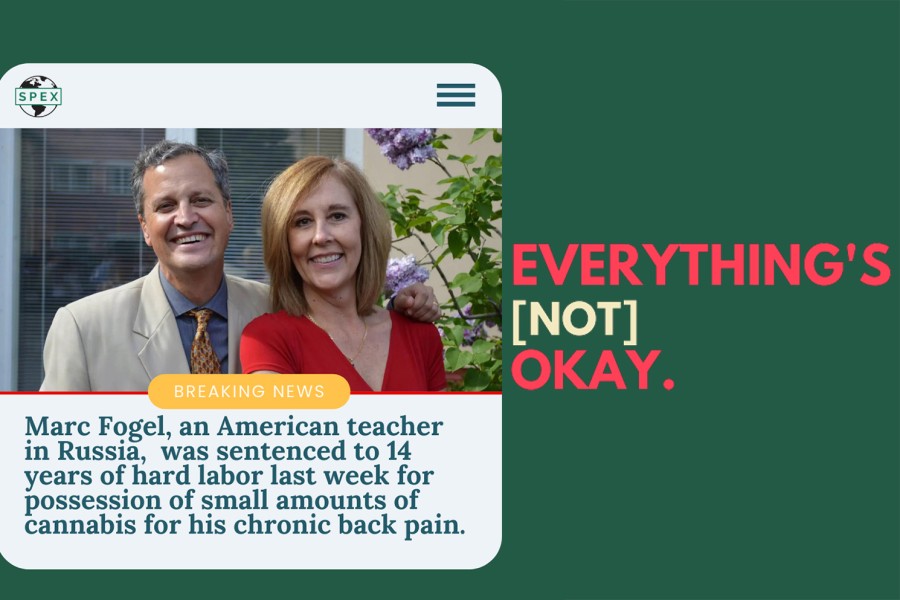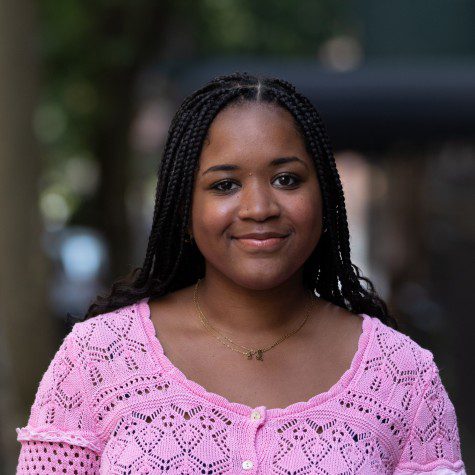Russia-imprisoned teacher Marc Fogel must be released, former student says
Two Stern students interviewed a former student of Marc Fogel — the teacher who was sentenced to 14 years in prison after being detained for drug possession in Russia.
A poster promoting an episode of the podcast “Everything’s (NOT) Okay,” which features a former student of Marc Fogel — the teacher who is currently imprisoned for possession of marijuana. (Courtesy of “Everything’s (Not) Okay” podcast)
September 8, 2022
While Marc Fogel was traveling on his way to teach at the Anglo-American School in Moscow in August 2021, Russian customs officers found marijuana in his luggage. The teacher had lived with chronic pain for several decades, undergoing three back surgeries, a hip replacement, spinal fusion and two knee surgeries. He received a prescription in the United States for “severe spinal pain” and uses the marijuana for medical purposes, but Russian law does not make exceptions for medical use.
Fogel was sentenced to 14 years in prison for “large-scale” cannabis smuggling in June. His sentencing came just one week before Brittney Griner, a WNBA player, was sentenced to nine years for drug possession. She had previously been detained at an airport in Russia in February after she attempted to fly with vape cartridges containing hashish oil.
Fogel’s case largely parallels Griner’s, but unlike the athlete, Fogel has not been classified as wrongfully detained by the U.S. government — a status that would allow the government to negotiate with Russia to secure his release. Since this interview was recorded, nine senators have called on Secretary of State Antony Blinken to declare Fogel as wrongfully detained. The State Department has since called for Fogel’s release but still has not classified the teacher as wrongfully detained.
In his interview on the podcast “Everything’s (NOT) Okay,” Mateo Graziosi, an NYU graduate who studied under the teacher at the Anglo-American School in Moscow, spoke about the widespread impact the teacher had on his students. Graziosi explained why he believes that sanctions resulting from the war between Russia and Ukraine have hindered progress on his case. He is calling on the U.S. government to take further action to bring Fogel home.
Stern junior Hannah Liu and senior Shreyas Sinha host “Everything’s (NOT) Okay” as part of the Stern Political Economy Exchange, a student organization that explores the intersection between international politics, economics and business. This interview has been edited for length and clarity.
Sinha: Do you have any stories or anything to tell us more about what he was like as a teacher? How did he connect with his students?
Graziosi: He was a great teacher. He was always very passionate. One of his big things was making sure that you vote. I’m definitely voting for my entire life and it’s because he talked about it so much. He was one of those people in school that always made sure we were in the right place. I say this and I don’t think I’m a standout case. I talked to a lot of friends that I haven’t caught up with in years when the news of his sentence broke out and they all said something similar. I have a friend who took his other class and said, “I’m going to [the University of California,] Berkeley because Fogel encouraged me to apply there.”
Everyone has a story or a perception of Fogel that he has gained by being an incredibly positive influence on all of our lives for as long as he’s been a teacher. But it’s hard to encompass what Fogel was like in a story because it was never about the individual moments so much as it was about the general aura of positivity that he would put out.
Sinha: Do you think something like this — [Fogel’s] 14-year maximum security [sentence] — would have been the same response he would have gotten if he would have gotten there before this Russian invasion of Ukraine and before the United States and the West just crippled the Russian economy using their sanctions? Do you think they’re using this in some way?
Graziosi: One hundred percent. The sentence is grotesque and inhumane and way, way longer than even was reasonable under the worst assumptions. On his verdict, it was established that he had no intention to sell or distribute the drugs. It was literally just for personal use under prescription [and it] seems so disproportionately aggressive.
It’s a very, very tough sentence and not proportionate to other cases that are similar to it. For me, this indicates it is clearly some kind of political scheme that no one deserves to be involved in.
Sinha: If you can make your case right now to President Biden, who is right now offering a Russian arms dealer in exchange for two Americans, WNBA player Britney Griner and ex-marine Paul Whelan, on why Mark Fogel should be added to this trade, what would you say to him?
Graziosi: Other than repeating the fact that I think Fogel is a fantastic person with an enormous heart and an incredible capacity to teach and has made one half of a mistake in his long career teaching in Moscow, that he’s being punished with his life. This is effectively a death sentence for him. He just lived his life and tried to live with chronic pain. It’s the most innocent crime.
Liu: You mentioned that you and former students [and] family members are pressuring Anthony Blinken as well as Joe Biden to include him in the swap. But for students like Shreyas and I, who may not have any personal affiliation or just found out about this subject, what are some ways now we can also help?
Graziosi: What we’re doing and what everyone should do is try to raise awareness from people who have the capacity to effect change. We’re sending letters out to Anthony Blinken to make sure that he sees that this is an important thing that needs to be addressed. There’s a petition going around, which last I checked was close to 7,000 signatures. There’s an Instagram account. Honestly, just get informed and get the word out. Make people mad about this because this is enraging. No one should be in this situation.
This interview first appeared on “Everything’s (NOT) Okay,” a podcast by Hannah Liu and Shreyas Sinha for the Stern Political Economy Exchange. Find out more about NYU SPEX here.
Contact Lauren Ashe at [email protected].

























































































































































